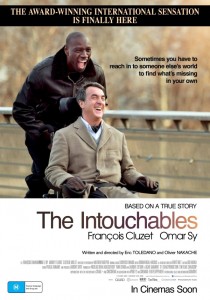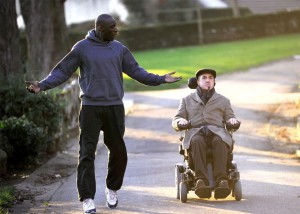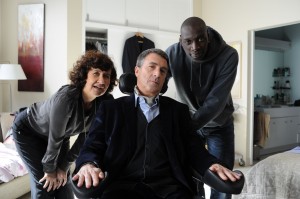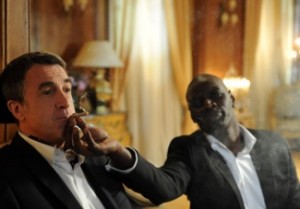
French cinema has never been afraid to cast aside earnest political correctness in favour of telling a raw and unvarnished story, a tradition largely maintained with worldwide hit, The Intouchables (which has taken almost a year to reach Australia for some reason).
I say largely because while this comedy-drama, directed by Oliver Nakache and Eric Toledano, is a brave re-telling of the inspiring, true story of the unorthodox relationship between a wealthy quadriplegic man Philippe (Francois Cluzet) and his carer/driver Driss (Omar Sy) who hails from the banlieue, the deprived suburbs that ring French cities, it isn’t quite the unvarnished portrayal you might expect.
That isn’t necessarily a damning criticism since the movie is generally unafraid to gleefully cast aside the niceties of polite discourse, a dynamic driven in large part by Driss’s unedited warts-and-all approach to life, in its pursuit of documenting the vast difference in life experience between the two men and the uniquely unfiltered and close relationship that grows out of that.
It is more a surprise that where it could have developed aspects of the men’s lives to give us a more complete understanding who they are when they meet, it shies away, giving us instead broad brush strokes peeks at the yawning gulf between the unrelentingly tough life in the banlieue, and the wealthier, privileged end of French society.

But that perhaps makes sense given that The Intouchables is less concerned with presenting Philippe and Driss as a microcosm for what could happen to France as a whole if only both sides of the divide could see eye to eye (which let’s face it, would have been far too ambitious a goal, and quite likely, simply untrue anyway), and more focused on giving us a look at a wholly noteworthy relationship between two markedly different people and the profound changes that result in both men when their two disparate worlds collide.
And it is, by any measure a remarkable partnership, irrespective of any wider implications.
The fact that this unusual friendship ever gets off the ground at all owes more to Philippe’s curiosity about the bombastic young man who answers a call for a general carer for the wealthy quadriplegic, simply so he can get a signature to authorise unemployment benefits.

He candidly admits this is his only motivation during the interview when Magalie (Audrey Fleurot), Philippe’s assistant and the woman who becomes an unattainable prize for Driss who is used to getting what he wants by charm or force, or a potent combination of both, asks him why wants the job.
Intrigued that anyone could be so untroubled about going through life without any real desire to make something more of who they are, Philippe, who clearly has worked hard to get where he is, begins a gently combative conversation with Driss who answers freely, unconcerned of course, about giving the “right” answers a job he doesn’t want.
(Unlike the series of applicants who front up before him, whose deliberately worthy, and sometimes downright clumsy, answers are shown in an hilarious montage that vividly illustrates why Philippe so wholeheartedly embraces Driss and his refreshing honesty.)
But get the job he does, not that he realises that as he leaves, thinking he is simply coming back the next day to pick up his signed form.
Philippe though has other ideas and sets a surprised but surprisingly acquiescent Driss to work when he comes to work the next morning (or not so surprisingly since Driss has had one of those nights, that include being kicked out of his home which have a way of leaving people with veyr little choice but to play the cards dealt to them).
It is a steep learning curve for the young man, but a combination of a crash-and-crash-through mentality, and a plucky joie de vivre sees him through a myriad of challenges which include feeding Philippe, learning the exercise techniques which take up most of the morning and keep him supple, and winning over Magalie, Yvonne (Anne Le Ny) and the rest of Philippe’s staff who regard Driss’s presence as little more than the result of a brain snap by their employer.

But win them over he does, and after a few missteps including taking a bubble bath (in a room that is roughly the size of his entire apartment in the banlieue) with his headphones on and the baby monitor that Philippe uses to communicate with him nowhere near, he becomes an effective, and unexpectedly intuitive carer for his employer who is frustrated by the limitations placed on him by his wheelchair-bound existence.
What draws the two men closer together is that both bring to the table a willingness to break free from the shackles of their previously tightly circumscribed lives, something neither men realises they have in them at that initial meeting.
Driss, for his part, played with admirable yet joyful restraint by Omar Sy in a part that could have easily become a cartoonish portrayal of a man well and truly out of his comfort zone, displays a willingness almost from the start to question why things are the way they are in Philippe’s life.
He laughs at the opera, pricks the pomposity of life in the rarefied strata of French society, compels Philippe to meet the mysterious Elionore with whom he simply has a penpal relationship, introduces him to smoking pot, and even spirits his employer out of the house for 4 am walks through Paris, all of which bring about a momentous shift in Philippe’s carefully set out but stultifyingly narrow existence.
His methods may be cavalier at times, but they come from someone who has never had the luxury of waiting for life to set its own pace, or been able to simple sit back and let the same old routines play out to ever diminishing returns.

But lest you begin to regard Driss as a more streetwise, grittier version of Anne of Green Gables or Pollyanna, singlehandedly sweeping in and enriching the blinkered lives of those whose worlds have faded to a muted shade of grey, Philippe, who is played masterfully and with great nuance by Francois Cluzet, in turn brings much needed change to his carer’s outlook on life.
Previously grasping for ways to practically demonstrate that he cares for those around him – his interactions up to this point have been fueled more by frustration that with any sensitivity to analysing what is wrong and working out a more appropriate, meaningful way to handle it – his time with Philippe teaches Driss to listen to people, and respond in ways that make sense for them, and ultimately, for him.
He remains throughout the same willfully irrepressible Driss but emerges at the end with a far more focused approach to life and the tools to handle it far more effectively than he ever did before.
And the change is palpable and powerful.
The Driss you see at the end of the movie is confident and self-assured in a way that the hit-and-miss Driss of the start of the movie could never have dreamed of being.
It is these profound changes in both men’s lives, which occur incrementally and believably through the course of the story, and are anchored in the unforgiving realities of modern day to day life, that power this heartfelt but never cloyingly sentimental film.